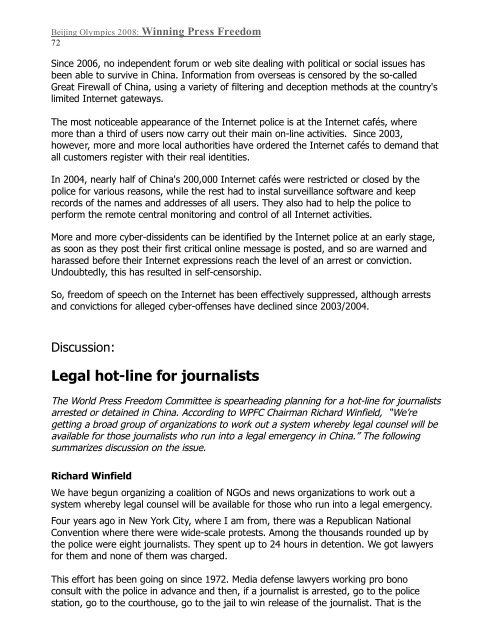Beijing Olympics 2008: Winning Press Freedom - World Press ...
Beijing Olympics 2008: Winning Press Freedom - World Press ...
Beijing Olympics 2008: Winning Press Freedom - World Press ...
Create successful ePaper yourself
Turn your PDF publications into a flip-book with our unique Google optimized e-Paper software.
<strong>Beijing</strong> <strong>Olympics</strong> <strong>2008</strong>: <strong>Winning</strong> <strong>Press</strong> <strong>Freedom</strong><br />
72<br />
Since 2006, no independent forum or web site dealing with political or social issues has<br />
been able to survive in China. Information from overseas is censored by the so-called<br />
Great Firewall of China, using a variety of filtering and deception methods at the country's<br />
limited Internet gateways.<br />
The most noticeable appearance of the Internet police is at the Internet cafés, where<br />
more than a third of users now carry out their main on-line activities. Since 2003,<br />
however, more and more local authorities have ordered the Internet cafés to demand that<br />
all customers register with their real identities.<br />
In 2004, nearly half of China's 200,000 Internet cafés were restricted or closed by the<br />
police for various reasons, while the rest had to instal surveillance software and keep<br />
records of the names and addresses of all users. They also had to help the police to<br />
perform the remote central monitoring and control of all Internet activities.<br />
More and more cyber-dissidents can be identified by the Internet police at an early stage,<br />
as soon as they post their first critical online message is posted, and so are warned and<br />
harassed before their Internet expressions reach the level of an arrest or conviction.<br />
Undoubtedly, this has resulted in self-censorship.<br />
So, freedom of speech on the Internet has been effectively suppressed, although arrests<br />
and convictions for alleged cyber-offenses have declined since 2003/2004.<br />
Discussion:<br />
Legal hot-line for journalists<br />
The <strong>World</strong> <strong>Press</strong> <strong>Freedom</strong> Committee is spearheading planning for a hot-line for journalists<br />
arrested or detained in China. According to WPFC Chairman Richard Winfield, “We’re<br />
getting a broad group of organizations to work out a system whereby legal counsel will be<br />
available for those journalists who run into a legal emergency in China.” The following<br />
summarizes discussion on the issue.<br />
Richard Winfield<br />
We have begun organizing a coalition of NGOs and news organizations to work out a<br />
system whereby legal counsel will be available for those who run into a legal emergency.<br />
Four years ago in New York City, where I am from, there was a Republican National<br />
Convention where there were wide-scale protests. Among the thousands rounded up by<br />
the police were eight journalists. They spent up to 24 hours in detention. We got lawyers<br />
for them and none of them was charged.<br />
This effort has been going on since 1972. Media defense lawyers working pro bono<br />
consult with the police in advance and then, if a journalist is arrested, go to the police<br />
station, go to the courthouse, go to the jail to win release of the journalist. That is the





